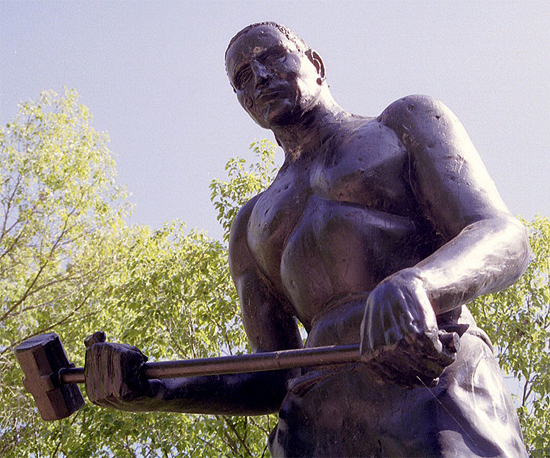By Lloyd Graff
 I was talking to a fan of Today’s Machining World who works at the world’s largest airplane builder. After discussing the Dreamliner’s ups and downs, he asked me if I thought machining could get too efficient. “What if x, y and z machining times got so fast you wouldn’t need any machinists,” he asked me. I laughed, but he went on.
I was talking to a fan of Today’s Machining World who works at the world’s largest airplane builder. After discussing the Dreamliner’s ups and downs, he asked me if I thought machining could get too efficient. “What if x, y and z machining times got so fast you wouldn’t need any machinists,” he asked me. I laughed, but he went on.
“Lloyd, did you know that BMW, Mercedes, Porsche and Audi decided that 155 miles per hour was as fast as non-professionals could safely drive on an autobahn, so they jointly decided to make that speed the maximum their cars would run?” he said.
His point about machining is that the builders make a mistake by constantly pushing machining speeds as improvements. He fears that we are losing the balance between machinist and machine.
The whole conversation sounded like a replay of the folk ballad of “John Henry, the steel driving man” who fought the track laying machines to a dead heat.
The engineer from Seattle sees being a welder as the only safe job in metalworking, because it cannot be outsourced to China and speed is limited by the melting temperature of metal.
Questions: Can machines be too efficient? Machinist or welder, who has more job security?
Johnny Cash – Ballad Of John Henry’s Hammer

4 Comments
Efficiency of a machine is limited by the programme it is given to execute which in turn depends upon the program/programmer. We will always need programmers to run these machines and machinists to operate them. The question about machinists and welders is mute. Welding is outsourced as we speak and on a grand scale. The retrofit of Bay Bridge in San Francisco Bay is delayed because of the sections of the bridge, made in China are on back order. Welding is done in China. To keep the jobs here we need to acquire skills in multiple disciplines and be good at them.
The reason Welding by and large will be insulated from outsourcing is that the high value jobs are done at the installation site. Unless the underlying industry moves, oil refining for instance, the jobs will remain. Aging infrastructure has huge needs for on site welding. Yes, sub assembly can be done off site, and that will continue, but Chinese welders will not be able to run turnarounds on refinerys in Texas or the gas fields in the MonDak shale zone because they are not there………
Porsche sells and I presume still sells cars that will exceed 155mph. (That works out to 250kph) That limit likely has more to do with tire certification and German liability law than anything else.
Meanwhile, various high speed pick and place robots are far too fast for people to keep up with, or even understand without help – so what? Computer CPUs have been much much faster than people almost since the beginning – we still learned to make them work.
As for offshoring – *any* object that can be shipped, or mostly shipped (large modules), and any service that can be delivered telematically, can be off-shored. So yea verily, large parts of welding and for that matter large parts of plumbing can indeed be off-shored.
The answer is to get the production chain to be more competitive – most likely with fewer people with more skills making good wages but driving the labor cost per unit of product ever lower.
The ceasless drive of competitive capitalism is the primary cause of the current global economic mess because it has created a huge surplus of labor by replacing people with machines. It follows that the unemployed laborers, now stripped of wages, diminish the demand side. Less demand, more layoff, less demand, more layoff, ad infinitum. Two possible solutions: 1) balance the economic cost of machine production with the cost of human production or 2) distribute the excess profit derived from gained efficiency to the displaced labor force.